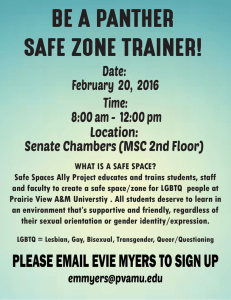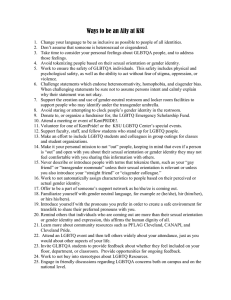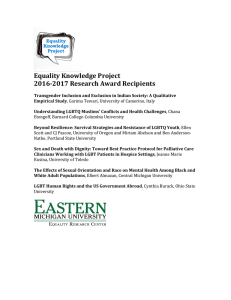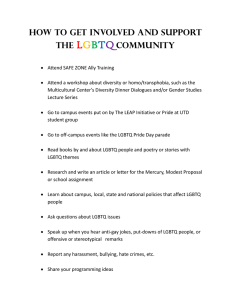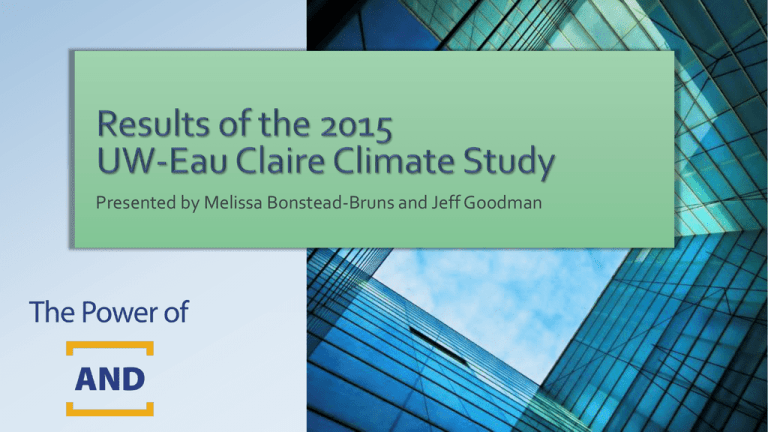
Presented by Melissa Bonstead-Bruns and Jeff Goodman
•
Teresa O’Halloran – Affirmative Action
•
Caitlin Lee – Affirmative Action
•
Mary Canales – Nursing (Previous EDI Fellow)
•
Erik Hulman – Student
•
Jeff Goodman – Psychology (Current EDI Fellow)
•
Melissa Bonstead-Bruns – Sociology (Current EDI Fellow)
Climate Study Committee
The Big Question…
Met with
stakeholders
for input on
survey items
Decision made
to update
Climate
Survey
• Fall 2013 –
Spring 2014
• Summer, 2013
Met with UW
– La Crosse
Climate Team
and gathered
research on
existing
climate
studies
Piloted survey
with students
and
stakeholders
• Spring 2014
• Fall 2013
Climate Study Timeline
Revised
survey,
sought IRB
approval,
planned rollout, obtained
incentive
items
Data clean-up
Initial results
released
• Fall 2015
• Summer 2015
• May 3rd, 2016
Survey open!
Data analysis
• February –
March 2015
• Fall 2015 –
Spring 2016
•
Problems with previous survey (Rankin, 2009)
The same survey was used for employees and students.
– Questions did not reflect unique needs of UW – Eau Claire.
– Numerous measurement issues were discovered.
– UW – Students and other stakeholders did not have input.
–
•
Some items from the Rankin survey were included to allow for
comparisons to be made over time.
Why Develop a New Climate Survey?
1.
Overall Climate
2.
Bias Incidents
3.
Perceptions of Climate
4.
Sexual Assault
5.
Disability: Access and Accommodation
6.
Work/Life Balance (Employee only)
7.
Inclusive Pedagogy
8.
Improving Climate
Areas of Focus for Preliminary Report:
Students
Gender Identity:
Female
1398
Male
581
Transgender, NonBinary, Gender
Queer, or Self
Identify
31
Other/Prefer not to ID
24
Employees
Female
Male
Other
347
200
Students
Sexual Orientation:
LGBTQ
Straight
Other/Prefer not to ID
Employees
135
1744
154
LGBTQ
Straight
36
472
42
1241
82
Range 19-72
Mean
44.7
Std. Dev.
12
1932
49
41
522
32
17
3168
779
5
18
Age:
Racial/Ethnic Identity:
Black
White
Asian
Latina
Native
Pacific
Multi
Total POC
Other
13
1719
140
24
7
1
69
254
43
Traditional
Non-Traditional
White
508
Nativity:
U.S. born
Nat. or Perm. Res.
Other
POC
Other
57
14
Total:*
Demographics of Respondents
3847
Overall Climate – Students and Employees
Climate in Eau Claire Community – Students and
Employees
Climate in Major Department/Unit – Students and
Employees
Climate in Classes – Students and Employees (Instructors
Only)
Additional Measures of Overall Climate - Students
Additional Measures of Overall Climate - Students
Number of Students Reporting Having Experienced Each Bias Incident Type (Respondents may
report more than one incident)
All
Students
Racial Profiling
Graffiti
Threat of Violence
Being a Target of Physical Violence
Being Stared At
Derogatory Remarks
Intimidated/Bullied
Admitted because of ID
Poor Grade because of ID
Speak on Behalf of ID
Ignored
Unwanted Physical Contact
Total # of Types of Incidents Reported
Total Number of Students Reporting
Being the Target of at Least One Bias
Incident
Total Respondents
Percent Experiencing at Least One Bias
Incident
POC
Women
LGBTQ
Students with
Mental Health
Disabilities
198
145
94
46
345
415
322
168
63
281
306
297
104
39
24
12
120
87
65
98
18
109
104
44
96
68
30
10
177
230
180
87
35
134
159
166
11
18
9
4
42
55
37
10
3
38
41
36
21
21
19
6
51
70
61
15
4
30
39
57
2680
824
1372
304
394
893
3168
172
256
491
1398
92
135
136
243
28.19%
67.19%
35.12%
68.15%
55.97%
Bias Incidents - Students
Number of Employees Reporting Having Experienced Each Bias Incident Type
(Respondents may report more than one incident)
All Employees
Racial Profiling
Graffiti
Threat of Violence
POC
Women
LGBTQ
25
18
18
12
4
2
11
9
5
0
2
0
7
91
152
161
28
76
94
39
1
19
22
23
13
25
23
15
1
45
73
94
13
36
50
18
0
4
10
8
0
9
6
3
Target of Unwanted Physical Contact
24
2
11
1
Total # of Types of Incidents Reported
733
161
366
43
Total Number of Employees Reporting
Being the Target of at Least One Bias
Incident
Total Respondents
274
674
41
55
147
332
17
35
40.65%
74.55%
44.28%
48.57%
Being a Target of Physical Violence
Being Stared At
Derogatory Remarks
Intimidated/Bullied
Hired Because of ID
Speak on Behalf of My ID
Ignored
Poor Evaluation Because of ID
Percent Experiencing Bias
Bias Incidents - Employees
Composite Measures:
•
Qualitative Composite:
–
“Please rate the overall climate on campus on the following dimensions:”
•
•
Personal Experience Composite:
–
“Based on your own experiences and observations, rate the overall climate on campus on the following
dimensions:”
•
•
Friendly/Hostile, Concerned/Indifferent, Cooperative/Uncooperative, Improving/Regressing, Welcoming/Non-Welcoming,
Respectful/Disrespectful, and Safe/Unsafe.
Non-racist/Racist, Non-sexist/Sexist, Non-homophobic/Homophobic, Not age-biased/Age-biased, Tolerant/Not tolerant of all types
of religious beliefs, and Positive/Negative for non-native English speakers.
What Respondents Would Tell Others Above Climate Composite:
–
“If someone were to ask about the climate at UW – Eau Claire, how positive do you think most people would say
the campus is on the following dimensions:”
•
Positive/Negative for people who identify as LGBTQ, Positive/Negative for people of my faith or worldview, Positive/Negative for
non-native speakers, Positive/Negative for people who are immigrants, Positive/Negative for international people, Positive/Negative
for people who are parents, Positive/Negative for people with disabilities, and Positive/Negative for people with low socioeconomic
status.
Perceptions of Climate
“Please rate the overall climate on
campus on the following
dimensions:”
Friendly/Hostile,
Concerned/Indifferent,
Cooperative/Uncooperative,
Improving/Regressing,
Welcoming/Non-Welcoming,
Respectful/Disrespectful,
Safe/Unsafe.
Perceptions of Climate: Qualitative Composite
“Based on your own experiences
and observations, rate the overall
climate on campus on the
following dimensions:”
Non-racist/Racist, Nonsexist/Sexist, Nonhomophobic/Homophobic,
Not age-biased/Agebiased, Tolerant/Not
tolerant of all types of
religious beliefs,
Positive/Negative for nonnative English speakers.
Perceptions of Climate: Personal Experience Composite
“If someone were to ask about the
climate at UW – Eau Claire, how
positive do you think most people
would say the campus is on the
following dimensions:”
Positive/Negative for:
• People who identify as LGBTQ
• People of my faith/worldview
• Non-native speakers
• People who are immigrants
• International people,
• People who are parents,
• People with disabilities
• People with low SES.
Perceptions of Climate: What to Tell Others Composite
•
A total of 4 transgender and 10 Gender Non-Binary, and Gender Queer
students provided responses to climate and bias incident questions.
•
Campus Climate:
–
•
These 14 students reported the highest levels of discomfort with climate on
nearly all of the aforementioned items (Ms 2.3 to 3.0 on the 5-point scale)
Bias Incidents:
–
Fifty % or more reported incidents of feeling intimidated, being stared at, and
receiving derogatory remarks
Transgender, Gender Non-Binary, and Gender Queer
Students
Percent of students in various groups who reported they have seriously
considered leaving UW-Eau Claire
•
•
•
•
•
•
•
•
•
•
•
•
•
Men
Women
POC
Black/African American
White
Asian American
Latino/Latina American
Straight
LGBTQ
White Men
Women of Color
Men of Color
Trans, Non-Binary
Consider Leaving University
30.5%
30.8%
45.3%
61.5%
28.9%
42.3%
50.0%
28.9%
46.7%
27.7%
41.4%
51.5%
71.4%
What would you do if you observed a student writing a racist
statement on a restroom mirror?
100%
90%
80%
70%
60%
50%
40%
30%
20%
10%
0%
Employees
Nothing
Bystander Effects
Erase It
Students
Report Comment
Report Student
Confront Student
Racial/Ethnic Identity of Victim
2015
Sexual Assaults/Attempted Sexual Assaults - Students:
124 (4.5%)
Sexual Assaults/Attempted Sexual Assaults - Employees:
0 (0.0%)
Sexual Assault Data
0.0%
89.3%
2.7%
2.7%
4.0%
9.4%
Sexual Orientation of Victim
2009
Sexual Assaults – Students and Employees:
Black
White
Asian
Latino
More than one race
Person of color
88 (2.0%)
Asexual
Bisexual
Homosexual
Heterosexual
Pansexual
Questioning
Identifies as more than one
Total LGBTQ
2.7%
9.5%
6.8%
70.3%
1.4%
1.4%
8.1%
19.4%
Victim Residence
University Status of Victim
2.7% 2.7%
12.0%
34.7%
13.3%
16.0%
28.0%
60.0%
30.7%
Live in residence halls
Live off-campus
Live with partner/spouse
Live with parents/family/relatives
Sexual Assault Data
First year UG
Third year UG
Fifth year+ UG
Second year UG
Fourth year UG
Characteristics of Known Offenders
Offender Characteristics
4.0%
3.5%
3.5%
1.2% 7.0%
23.3%
37.1%
72.1%
69.4%
Someone I knew
Someone I did not know
Other
Victim Demographics
Another Student
Friend (unaffiliated with UWEC)
UWEC employee/faculty
Family member
Prefer not to answer
Other
Location of Incidents
2.7% 1.3%
6.5%
9.3%
39.5%
61.3%
86.7%
Female
Male
Non-Binary or Gender Queer
Other
Off-campus (EC community)
On-campus
Other location
Response to incidents:
Percent answering 'Agree' or 'Strongly Agree'
Sought support from off-campus services
Told a friend
Told a family member
Sought support from CASA
Sought medical services
Sought support from staff
Sought support from faculty
Sought support from spiritual adviser
Sought support online
Told no one
Sought no support
4.0%
72.7%
17.4%
5.8%
7.4%
8.3%
4.1%
5.8%
7.4%
17.4%
24.2%
Reported to Campus Police
Reported to other law enforcement
Did not file report
Did not file report but sought support
4.1%
2.5%
85.1%
12.4%
UWEC officials responded appropriately
I was taken seriously
Corrective action was taken
Steps were taken to protect my safety
I was referred to appropriate services
Appropriate steps were taken
Not enough was done
I received the support I needed
Response to Assault and Satisfaction with Support
60.0%
60.0%
25.0%
25.0%
45.0%
40.0%
35.0%
35.0%
Respondents with Conditions that Substantially Affect Major Life Activities (n)
2009 and 2015
300
243
250
200
150
100
63
50
73
72
44
34
12
6
17
6
13
0
Students
Employees
Students
2009
Physical Disability
Employees
2015
Learning Disability
Psychological Condition
Accessibility and Accommodations
16
Of the (61) students who reported being issued a VISA, 59* reported on their experiences
obtaining accommodations:
•
34.0% have worked with instructors who were resistant to providing needed accommodations (18 of 53);
•
87.5% reported that instructors are friendly when discussing accommodations (49 of 56);
•
66.7% reported that instructors know how to get them the accommodations they need (36 of 54);
•
24.3% have had difficulty finding financial resources to support their accommodations (9 of 37);
•
21.7% report that getting the accommodations they need is so difficult, they rarely request them anymore
(10 of 46);
•
21.3% indicated that one or more instructors they have worked with has refused to provide them
accommodations or has made the process too difficult to be practical (10 of 47).
* Students who responded N/A are not included in the percentages given.
Accessibility and Accommodations
* Centennial was inadvertently left off of the Employee Survey. Data presented represents student responses only.
Percent of students with disabilities who indicated “Accessible” or “Very
Accessible” for various campus buildings and services:
•
•
•
•
•
•
•
•
•
Dining Facilities
Residence Halls
Classroom labs and studios
Computer labs
D2L
In-class instruction
Online and hybrid courses
UW – Eau Claire website
Classrooms in general
60.0%
28.0%
47.1%
59.9%
83.3%
67.6%
73.0%
66.7%
54.1%
Student Responses to Selected Accessibility Items
Composite Measures:
•
Performance Evaluation: concern for bringing up issues; feelings of being under scrutiny; navigating
“unwritten rules” of the unit
•
Collegial Pressure: feeling as though one is asked to speak on behalf of their identity; feeling pressure to
modify one’s research and/or work harder in order to succeed
•
Career Priority: feelings of being reluctant to take leave; feeling like the object of higher expectations
•
Commitment/Children: feeling like employees with children are seen as less committed to their careers;
feeling like employees without children feel burdened with extra work, seeing the University as unfair in
health benefits provided to single parents
•
Balance: concern over balancing work and personal life; feeling as though one misses out on things
because of work; feeling as though one is not compensated fairly
•
Equity: feeling as though one has equitable access to work-related resources such as laboratory space,
classroom resources, equipment/technology, and supplies; feeling as though one has equitable access to
health care and domestic partner benefits
•
Collegial Support: feeling that one has support and/or can seek advice from colleagues and decision
makers
Work/Life Balance – Employees Only
Performance
Evaluation: concern
for bringing up issues;
feelings of being
under scrutiny;
navigating “unwritten
rules” of the unit
(The larger the mean, the greater the concern over performance evaluation issues.)
Work/Life Balance – Performance Evaluation Scale
Collegial Pressure:
feeling as though one is
asked to speak on
behalf of their identity;
feeling pressure to
modify one’s research
and/or work harder in
order to succeed
(The larger the mean, the greater the collegial pressure.)
Work/Life Balance – Collegial Pressure Scale
Balance: concern
over balancing work
and personal life;
feeling as though one
misses out on things
because of work;
feeling as though one
is not compensated
fairly
(The smaller the mean, the greater the concern over balance and compensation.)
Work/Life Balance – Balance Scale
•
Classified staff were significantly less likely than all employees to feel
they have collegial support (mean = 3.37 vs. 3.53 for all employees).
•
Women are significantly more likely than men to feel that their family
obligations will make them seem less committed to their job (mean =
2.55 vs. 2.36).
•
POC are significantly more likely than all employees to feel that their
family obligations will make them seem less committed to their job
(mean = 2.80 vs. 2.49).
•
On the whole, most employees feel they have equitable access to
resources, though the mean for POC was marginally lower than
employees as a whole (mean = 3.65 vs. 3.83).
Work/Life Balance – Other Issues of Note
Inclusive Pedagogy: Diverse Cultures
Inclusive Pedagogy: Gender
Inclusive Pedagogy: Race
Inclusive Pedagogy: Sexual Orientation
Eighteen Items from the Symbolic Racism Scale (Henry & Sears, 2002) were modified
to evaluate attitudes toward a number of different social groups. Factor analysis
resulted in 3 factors:
•
Acknowledging the Continued Effects of Racial Discrimination (8-items; α = .89):
–
–
•
Support for LGBTQ and Diverse Religious Beliefs (5-items; α = .85):
–
–
•
“e.g., Discrimination against Hmong Americans in the US has limited their chances to get ahead”
“e.g., White Americans are responsible for most of the racial tension in the US today”
“e.g., Lesbian couples should be allowed to adopt children the same as straight couples”
“e.g., People who are atheists share my vision of America”
Endorsement of Meritocracy and Social Dominance (4-items; α = .85):
–
–
“e.g., Irish, Italian, Jewish, and many other groups overcame prejudice and worked their way up.
African Americans should do the same”
“e.g., On the whole, men make better political leaders than women do”
General EDI Attitudes: Employees
•
Whites and POC did not differ on any of the 3 scales
•
Women reported lower, while Men and White Men reported higher
endorsement of Meritocracy
•
LGBTQ reported higher Acknowledgment of Racism and Support for
LGBTQ and Diverse Religious Beliefs; lower endorsement of
Meritocracy than all others
•
Christians reported lower Acknowledgment of Racism and Support for
LGBTQ and Diverse Religious Beliefs; higher endorsement of
Meritocracy than all others
General EDI Attitudes: Employees
•
Climate Report published on University website
•
Public datasets released
•
Additional analysis completed
•
Use results to inform campus decisions on EDI Initiatives
Where Do We Go From Here?

